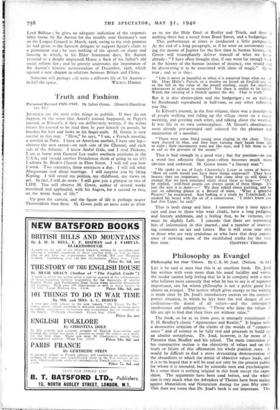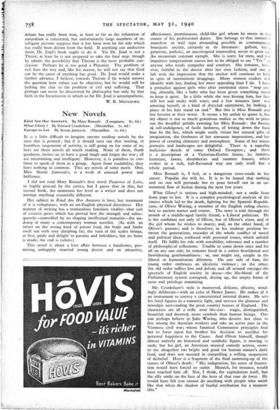Philosophy as Evangel
Philosophy for Our Times. By C. E. M. Joad. (Nelson. 78. 6d.) LET it be said at once that this is an excellent book. Dr. Joad has written with even more than his usual lucidity and verve; the reader cannot help feeling that he is in company with a man who believes most earnestly that what he has to say is of supreme importance, one for whom philosophy is not a polite game but almost an evangel. The motive which gives energy to the writing is made clear by Dr. Joad's introductory section on the contem- porary situation, in which he lays bare the real danger of our
civilisation—the denial of all values—and the consequent
incoherence and unhappiness. " Those who deny the values of life are apt to find that their lives are without value."
The book, so far as its form goes, is strangely reminiscent of F. H. Bradley's classic " Appearance and Reality." It begins with a destructive criticism of the claims of the worlds of " common sense " and of science to be fully real and proceeds to build up an idealist metaphysic. Dr. Joad, however, is far more of a Platonist than Bradley and his school. The main contention of his constructive section is the objectivity of values and on the truth or falsity of this affirmation his whole position rests. It would be difficult to find a more devastating demonstration of the absurdities to which the denial of objective values leads, and it is to be hoped that it will be read not only by the general public for whom it is intended, but by scientific men and psychologists. In a sense there is nothing original in this book except the expo- sition. The arguments have been used before, and the whole case is very much what the defenders of Theism have been saying against Materialism and Naturalism during the past fifty years. This does not mean that Dr. load's book is not important. The
dekate has really been won, at least so far as the refutation of naturalism is concerned, but unfortunately large numbers of in- telligent persons suppose that it has been won by the side which has really been driven from the field. If anything can undeceive them, Dr. Joad's book ought to do it. Yet Dr. Joad is not a Theist; at least he is not prepared to take the final step, though he admits the possibility that Theism is the most probable con- clusion. Perhaps he is too good a Platonist. The problem of evil bars the way and, like his master, he will not say that God can be the cause of anything but good. Dr. Joad would make a further advance, I believe, towards Theism if he would answer the question how values can be objective, but he would still be lacking the clue to the problem of evil and suffering. That perhaps can never be discovered by philosophy but only by that faith in the Incarnation to which so far Dr. Joad is unsympathetic.
W. R. Marrimws.































 Previous page
Previous page